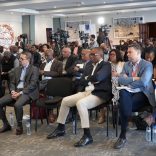Mozambique: US funding cut halts construction of Pebane and Mopeia district hospitals
Opinion: Time for true inclusive innovation in Africa – By Fabio Scala

We all know that the development of most African countries depends on a number of factors. Unfortunately there are no golden formulas or magic tricks to speed up growth.
Most people are familiar with the African proverb “If you want to go fast, go alone – If you want to go far, go together”. Never before has that expression rang so true as it does to me in the times we are living.
More than ever, inclusion is becoming key for development. Up to a few decades ago, emerging markets that were left behind due to a lack of infrastructure, (particularly in terms of communication), are now coming online.
And they are coming in fast and massively. Whether through aid, donors or Chinese backing, a number of infrastructure projects are rapidly connecting Africans.
The delay in development meant that most African countries did not have to follow (and pay for) the steps of technology over the last decades. In a way, that’s positive as they now have the latest technology coming in rather than dealing with costly and outdated infrastructures.
When I think of that, two personal episodes come to mind.
The positive one: Witnessing the impact of fibre optics going into the city of Beira (as one of the projects I was involved with in Mozambique) and;
The negative one, moving to central London 4 years later and being informed that I could not sign up for fibre as my entire block did not have the “right cabling for the service”.
Information communication technologies (or ICT) is proving to be one of the most effective empowerment tools to the African population. Take for instance M-Pesa, which has enabled much of the continent’s unbanked population to become part of a financial inclusion momentum which has taken the continent by storm. A lot of people in western institutions don’t realize the impact of accessing financial services in Africa, particularly in more remote locations.
The so called “innovation policymakers” need to start paying attention to what is happening in Africa and stop promoting their “proven” policy solutions from their home countries.
It is crucial to start understanding the developments taking place on the ground. When we say “Inclusive innovation”, the expression may have different interpretations and meanings to different people. (depending on where you are coming from in the world and either you have had on-the-ground African experience or not).
In Africa, “inclusive” must take into consideration what some like to call “the informal economy”. Before one realises that this is the “only” economy that a lot of regions know, it is hard to be truly inclusive.
Indigenous and local entrepreneurs are the pillar to inclusive innovation and they are often marginalised by foreign policymakers as they are labelled as the “informal” market.
The time has come to be creative and implement appropriate metrics to measure actual innovation taking place on the ground and to accept the fact that a small farmer taking his modest harvest into the local market and transacting his goods using M-Pesa is a key part of this equation.
We are only going to see true inclusive innovation when we begin to factor-in the actual events taking place and stop trying to dictate policies from a comfortable office in a developed country thousands of miles away.
On the second edition of the EurAfrican Forum (coming up July 4-5th in Portugal), much of the agenda will focus on equality (between Africa and Europe) and one panel in particular, entitled “African entrepreneurs driving inclusive innovation and growth” intends to illustrate the African reality of Inclusive innovation. I can’t hardly wait to heat their insight! See you there.
By Fabio Scala












Leave a Reply
1 Comment on "Opinion: Time for true inclusive innovation in Africa – By Fabio Scala"
You must be logged in to post a comment.
You must be logged in to post a comment.
Fabio, if inclusive means how the few get a royal cut of every deal then it’s fine. Your article is simply some boiler plate conventional wisdom for the guys sitting “in a comfortable office in a developed country thousands of miles away”. In fact the reality is totally different and I have no problems to explain that to the guys sitting in a comfortable office in Maputo thousands of miles away from the reality in the hinterland. Best JPC